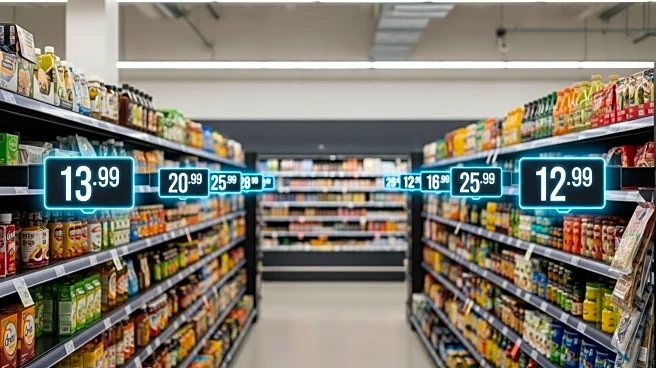What is the story about?
What's Happening?
Electronic shelf labels (ESLs) are becoming increasingly common in U.S. grocery stores, allowing retailers to update product prices instantly. Major retailers like Walmart, Kroger, and Whole Foods are integrating this technology to improve efficiency and reduce waste. Walmart plans to replace paper labels with digital ones in 2,300 stores by the end of the year. Despite the benefits, there are concerns about potential dynamic pricing, where prices could change based on demand, such as increasing the price of umbrellas during rain. Lawmakers, including Rep. Rashida Tlaib, have expressed concerns about price gouging and privacy issues related to ESLs. Research indicates that surge pricing has not been implemented with ESLs, but regulators are closely monitoring the situation.
Why It's Important?
The expansion of ESLs in grocery stores could significantly impact consumer shopping experiences and pricing strategies. While the technology promises efficiency and consistency between online and in-store prices, it raises concerns about potential price manipulation and privacy. If dynamic pricing becomes prevalent, consumers could face fluctuating costs, affecting affordability and trust in retailers. Lawmakers are pushing for regulations to prevent price gouging and protect consumer interests. The outcome of these regulatory efforts could shape the future of retail pricing and consumer protection in the U.S.
What's Next?
Lawmakers in 24 states have introduced bills to regulate algorithmic pricing, including dynamic pricing. The Stop Price Gouging in Grocery Stores Act, introduced by Rep. Tlaib, is under review by House committees. If passed, it could lead to significant changes in how grocery stores implement ESLs. The National Retail Federation is challenging a New York law requiring transparency in personalized pricing, arguing it unfairly targets a system that benefits consumers. The legal and legislative developments will determine the extent of regulation and its impact on retailers and consumers.
Beyond the Headlines
The adoption of ESLs could lead to broader discussions on ethical pricing practices and consumer privacy. As technology advances, retailers may explore more personalized pricing strategies, raising questions about fairness and transparency. The balance between technological innovation and consumer protection will be crucial in shaping the retail industry's future.
















